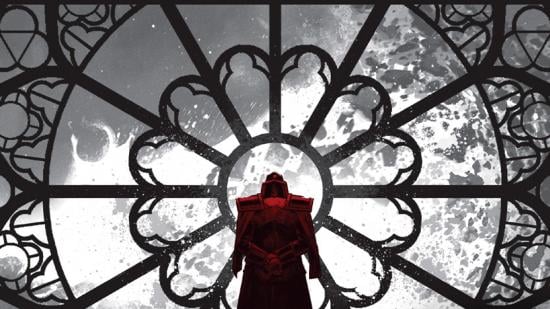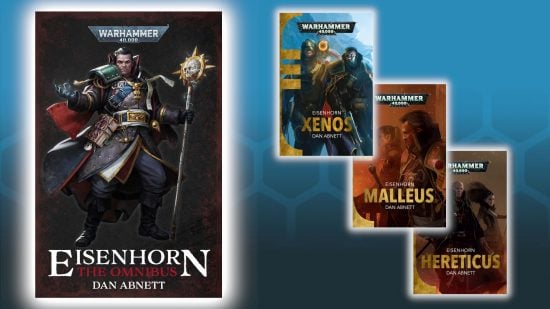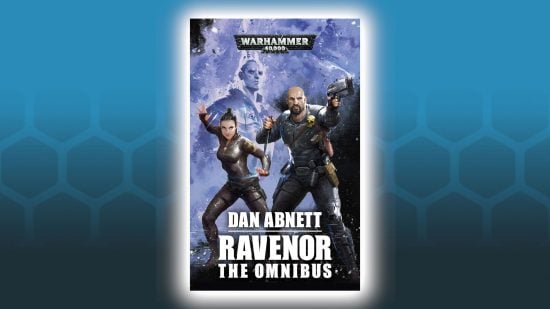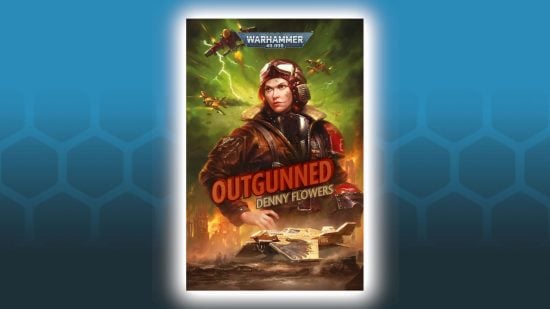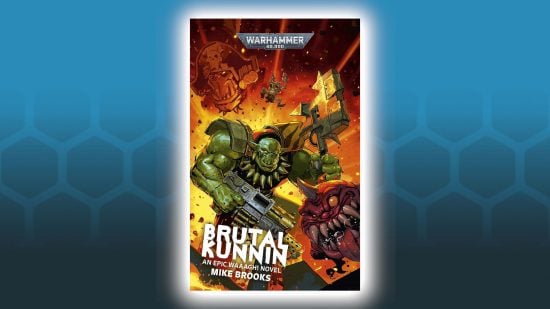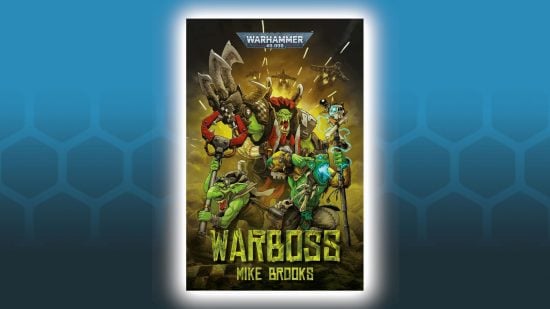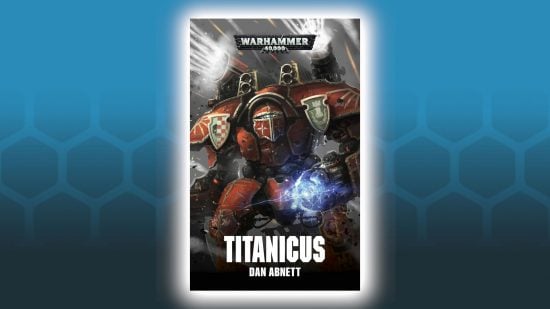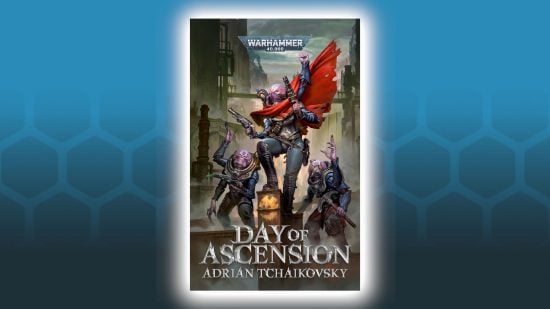What are the best Warhammer 40k books? It’s a big library to sort through; in the far future of the 41st millennium there is only war, but there’s a lot of war, and that means countless tales to tell. Many excellent sci-fi authors have lent their pens to this setting, from the classic Horus Heresy saga to brand new 40k novels. This guide lists the absolute best books and series to pick up if you want to explore Games Workshop’s grim, dark future.
The list of Warhammer 40k books below should provide a great starting point. Most of these titles are available as audiobooks or eBooks over at Black Library, so however you like to read, you’re covered.
Oh, and if you want to get stuck into a really long series, we’d advise taking a look at out our guide to the Horus Heresy book order. But now for a list of greatest hits…
The best Warhammer 40k books and series are:
- Eisenhorn series
- Gaunt’s Ghosts series
- Ciaphas Cain series
- Horus Rising
- Grey Knights series
- Ravenor trilogy
- Outgunned
- Brutal Kunnin’
- Warboss
- Titanicus
- Day of Ascension
1. Eisenhorn series
| Author | Dan Abnett |
| Book 1 | Xenos |
| Book 2 | Malleus |
| Book 3 | Hereticus |
| Book 4 | The Magos |
An often-recommended starting point for any fan looking for their first Warhammer 40k book, Dan Abnett’s Eisenhorn series follows the career of Gregor Eisenhorn, an Imperial Inquisitor of the Ordo Xenos, as he tries to root out and curtail the influence of alien forces in the Imperium of Man.
Through the four Eisenhorn books, Abnett does a fantastic job of bringing a cast of likeable characters to life, while weaving in setting details that will excite long-time Warhammer fans, without leaving newbies in the dark.
It’s a must-read for fans of intrigue and adventure, and has interesting overarching themes, as Eisenhorn tackles threats that make him question his methods, and may force him to make unthinkable compromises.
We recommend the Omnibus (linked above) as the easiest way in here, as it includes the original trilogy – 3/4 of the series – for around $20. Once you’re hooked, you can pick up book four to complete the set.
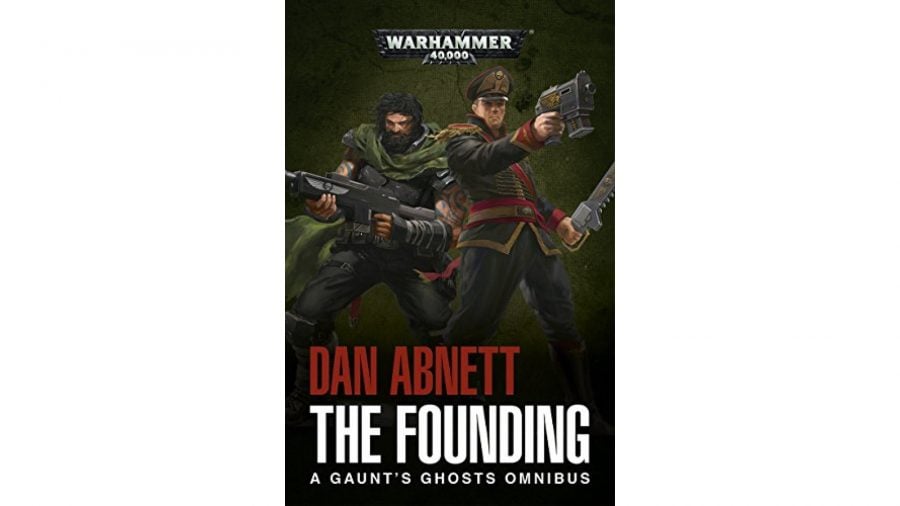
2. Gaunt’s Ghosts series
Another Abnett series (and you’ll see his name again before we’re through). Where Eisenhorn follows the exploits of an esoteric secret policeman wielding immense power and authority, the Gaunt’s Ghosts series takes us to the other end of the spectrum.
Through 15 books, we follow a ragtag group of average Astra Militarum soldiers – the Imperium’s human line troops, for whom facing impossible odds and almost certain death at the hands of the Emperor of Mankind‘s enemies is just Tuesday.
The titular protagonist, Colonel Commissar Ibram Gaunt – a grizzled political officer-turned-battlefield commander – has only just taken command of a new Guard regiment – the Tanith First – when the soldiers’ home planet is destroyed by Chaos, a tragedy for which much of the regiment blames him personally.
Through a succession of thrilling adventures and brutal battles, we witness Gaunt earn his regiment’s trust, respect, and even adoration by repeatedly showing strategic brilliance, courage, and self-sacrifice, as well as standing up to the Guard’s byzantine bureaucracy and idiotic aristocrat generals.
At its lows, we see the appalling waste of human life and potential that characterizes 40k’s warlike setting, writ large and made all the more tangible by the recognizably human characters and low-tech warfare.
Gaunt’s Ghosts is often described as Band of Brothers meets 40k, and chances are you’ll be cursing the author a few times throughout the book series when your favourite characters bite the dust. Nothing drills in the horror of the Warhammer 40k setting quite like the perspective of the Imperial Guard.
Almost all the novels hold up and function pretty well as standalone stories, but the series is best enjoyed as a long, slow, building relationship between you and the Ghosts – so we recommend the Gaunt’s Ghosts Omnibus (linked above) as the ideal starting point.
It includes the first three books – First And Only, Ghostmaker, and Necropolis – which should be more than enough to get acquainted.
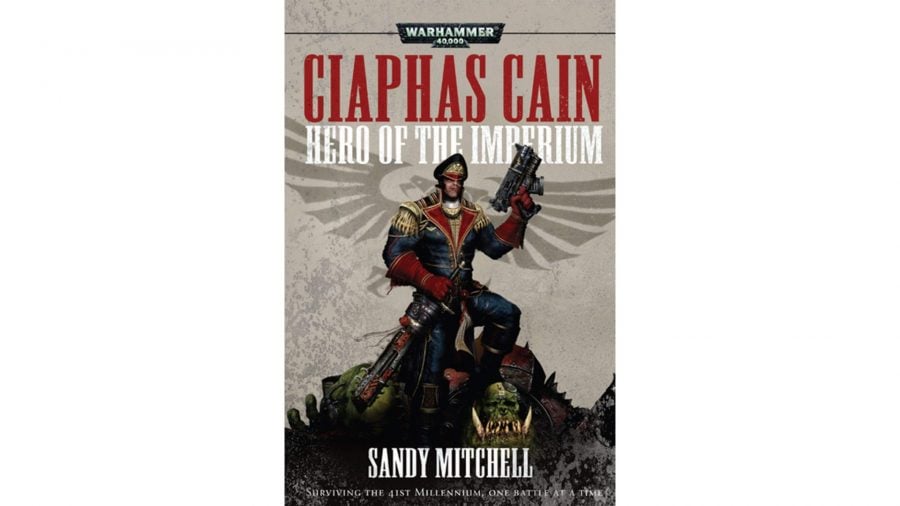
3. Ciaphas Cain series
The Ciaphas Cain series, by Sandy Mitchell, is a more light-hearted set of Warhammer 40k books – quite the rare thing. It follows its titular main character, who’s basically 40k’s equivalent of Blackadder or Flashman, through all sorts of scrapes.
Ciaphas Cain is seen as a hero by the wider world, but in reality he’s something of a shirker, just trying to survive in a setting that seems pretty averse to the idea.
Cain’s sardonic, sarcastic humour drives the series, and sets its slightly goofier tone, which can be refreshing when you’re tired of reading about people getting their legs chewed off by Orks or their eyeballs exploded by Chaos daemons.
Plus, Cain is actually pretty cool at times, despite his self-proclaimed cowardice.
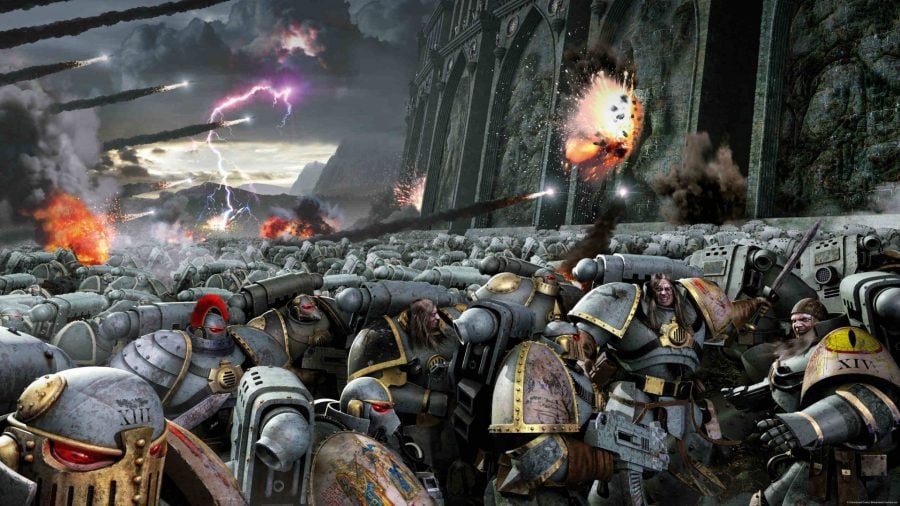
4. Horus Rising
The Horus Heresy series is something of a juggernaut among Warhammer 40k books, spanning 62 novels in total. It’s essentially the game’s prehistory, set 10,000 years before the current 40k storyline, and tells the tale of an enormous, galactic civil war that splits the human empire in two.
Dan Abnett’s 2016 novel Horus Rising is the very first novel in the Horus Heresy series, introducing you to the Warmaster Horus Lupercal, and giving you a brief who’s who of the other Space Marine primarchs and Astartes Legions, before any of them are corrupted and turn on the Emperor.
It’s the calm before the storm, sowing the seeds for the long civil war that is to follow – portraying the primarchs and their Great Crusade at its most glorious, but also the cracks underneath the surface, foreshadowing the disastrous deeds to come.
There’s much to recommend this epic series, though it has plenty of peaks and troughs along the way. If you want to dip your toe into these intimidating waters, there’s no better place to start than with book one. In Horus Rising, Abnett writes strong characterisation, and the expected solid action scenes, for godlike superhuman Space Marines.
For more detailed suggestions, check out our full Horus Heresy reading order guide.
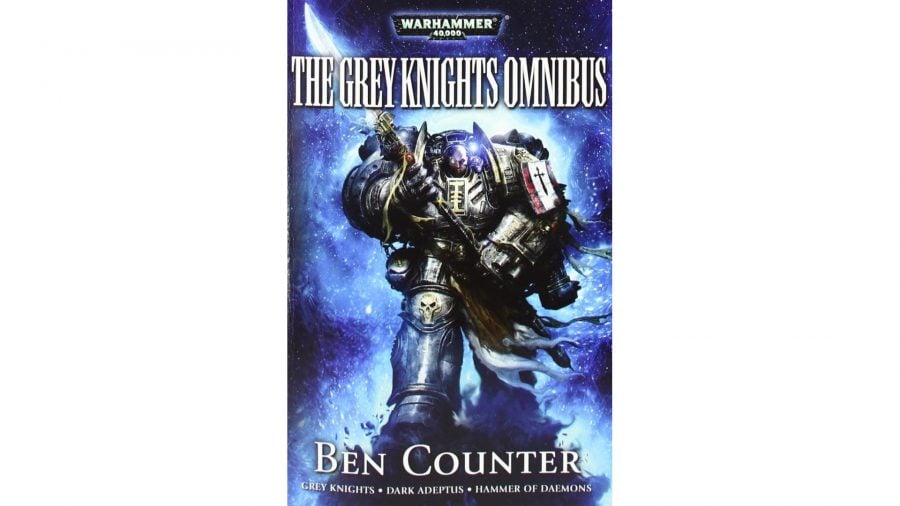
5. Grey Knights
If you’ve enjoyed Chaos Gate: Daemonhunters and want to know more about the daemon-hunting, battle-prayer shouting, semi-medieval legion of the Grey Knights, then this Warhammer 40k book by Ben Counter, simply titled ‘Grey Knights’ is the place to look.
Packed with action, from hostage scenes in high-rise offices to large scale spaceship battles, Grey Knights is classic Warhammer 40k pulp. It’s the start of a three-book series, but the first one is the best of the bunch.
It peels back the curtain on one of the more mysterious subfactions of the Imperium and provides a closer look at the forces of chaos. Read with eyes half-lidded if you don’t want to fall prey to the corruption of the warp.
6. Ravenor trilogy
A spin-off of Dan Abnett’s Eisenhorn series, his Ravenor trilogy follows Eisenhorn’s former protégé, Gideon Ravenor, as he embarks on his own inquisitorial career. Grievously injured in a terrorist bombing, Ravenor is enclosed in a mobile life support chair, reliant upon his skills as a psyker and his retinue of elite operatives to root out heresy and corruption.
The three novels, Ravenor, Ravenor Returned, and Ravenor Rogue, chart a single investigation: the spread of flects, a dangerous new drug that can drive the user insane. Ravenor’s inquiries lead him to the world of Eustis Majoris, the centre of the flect trade and of a conspiracy that spreads throughout the sector.
With two other returning characters, Harlan Nayl and Kara Swole, this trilogy is a great followup to the Eisenhorn series, while its tighter focus offers a deeper study of the underbelly of the Imperium than you’ll find anywhere else.
7. Outgunned
Denny Flowers’ novel Outgunned shows us a new side of life in the 41st millennium: that of the propaganda and misinformation that drives the Imperium.
Propagandist Kile Simlex is tasked with filming a documentary about flying ace Lucille von Shard. But, in the skies over the fetid swamps of Bacchus, he finds his ‘hero’ to be arrogant, insubordinate, and nihilistic, and the war against the Orks is going much worse than anyone will admit.
With the civilian Simlex at its centre, Outgunned gives us a new perspective on the Imperium’s endless wars and how the’re sold to the wider population.
The book has a dark, satirical streak reminiscent of Warhammer 40k’s earlier incarnations, especially in its portrayal of Imperial propaganda and the competing political interests Simlex has to appease.
8. Brutal Kunnin’
In Mike Brooks’ novel Brutal Kunnin’, an Ork Waaagh! lands on the Forge World of Hephaesto but finds the planet is already being attacked by Kaptin Baddrukk and his Freebooters.
The two armies agree to work together, as much as Orks can do when there’s loot to fight over. Ufthak Blackhawk and his trusty squig Princess will have to face the forces of the Adeptus Mechanicus, treacherous Freebooters, and an irritating Grot if he’s to survive.
Full of black humor (or should that be green?), Brutal Kunnin’ is a rare funny 40k novel, carefully balancing this against the brutality of its Ork protagonists and the grimdark setting.
9. Warboss
Another Brooks novel, Warboss focuses on an Ork power struggle which turns out to be more House of Dakka than House of Cards.
When Gazrot Goresnappa is accidentally crushed beneath a gargant’s head, the Orks besieging the Imperial world of Aranua are thrown into disarray. Three of the dead warboss’s lieutenants and one ambitious Grot race to reach the Aeldari webway gate hidden beneath a hive city.
The first to the prize will become the new warboss and lead the Waaagh across the stars. But will it be Blood Axe leader Da Genrul, Goff boss Mag Dedfist, Speedboss Zagnob, or leader of Grot rebellion Snaggi Littletoof?
Like Brutal Kunnin’, there’s a lot of humor throughout the book – even down to the chapter numbers, this time. And if there were a few too many humies in Brutal Kunnin’ for you, Warboss focuses much more on the Orks, with only one human point-of-view character.
The Grot uprising plotline builds on the Red Gobbo novellas, the first of which, Da Gobbo’s Revenge, was also written by Brooks.
10. Titanicus
Another Dan Abnett spinoff, Titanicus follows the defense of the Forge World Orestes from a Chaos invasion. The titans of the Legio Invicta are quickly diverted to support the planet, but rivalries – and even theological disputes – between the Legio and the tech-priests of Orestes threaten to divide the Mechanicus forces.
Despite its title, Titanicus deals with much more than just the titan legions. Here, Abnett shows us a different side to the Sabbat Worlds Crusade of his Gaunt’s Ghosts series.
Instead of following an infantry regiment from one campaign to the next, we see how a whole planet is affected by an invasion, from the inexperienced reservists called up to fight to the nomads that find themselves caught up in the war.
11. Day of Ascension
Adrian Tchaikovsky’s first book-length foray into the forty-first millennium, Day of Ascension is one of the rare novels to show us the perspective of a Genestealer Cult. When a tech-priest discovers a Genestealer infestation on the Forge World of Morod, he foolishly tries to use it to become the new Fabricator General and take control of the planet. But the cult has its own plans, and its young member Davien will find herself at the forefront of a revolution.
Tchaikovsky offers a detailed look at the Genestealer Cults and their motives, with the characters driven by a mix of twisted religion and more subtle alien imperatives. It results in a deeper and more interesting depiction than that of any Genestealer Cults codex, with a set of tragic and heroic characters, sympathetic for the suffering dealt to them by their tech-priest masters, but tainted by the alien infection that really controls them.
Why should you read Warhammer 40k books?
Warhammer 40k, at its core, is a hobby about collecting, building, painting, and playing tabletop wargames with cool miniatures. If that’s not for you, but sci-fi books are, fair enough – read away!
But, if the toys are what you’re after, why should you bother reading thousands of pages of pulpy sci-fi too?
The answer is simple: it makes the game immeasurably better. Each element enhances the other in a fantastically satisfying way that’s difficult to understand without experiencing it. Reading the books, getting to know the individuals who fight these wars and the fantastical forces they contend with, fills your tabletop battles with a whole new dimension of imaginative depth, colors, sounds, smells, and emotions. It’s symbiotic, and really compelling.
Sure, there can be great storytelling in tabletop wargames during play, but if you really want to get to grips with the Warhammer 40k universe, you’re going to have to step away from painting miniatures for a bit, and do some reading.
What makes the best Warhammer 40k books?
As you’d expect, Warhammer 40k authors can take advantage of the expansive lore already baked into the many Warhammer 40k factions, taking familiar characters and armies on action-packed adventures, blowing up some bad guys, and leaving it at that.
But the best 40k novels dive further, charting out new lore, and tackling the questions thrown up by its grimdark setting. Questions like: how does humanity react when pitted up against a terrifying hostile universe? Can you do the right thing in a flawed, often brutal system? When do the ends justify the means?
It’s this kind of detailed, meaningful, multi-leveled storytelling that gets us interested.
If you’re looking for more interactive options, though, there’s always our guides to the best Warhammer 40k games and best Warhammer fantasy games. And, for tabletop fans who don’t want to go the whole hog and collect a wargame army, we’ve collected a list of the best Warhammer board games, too.
